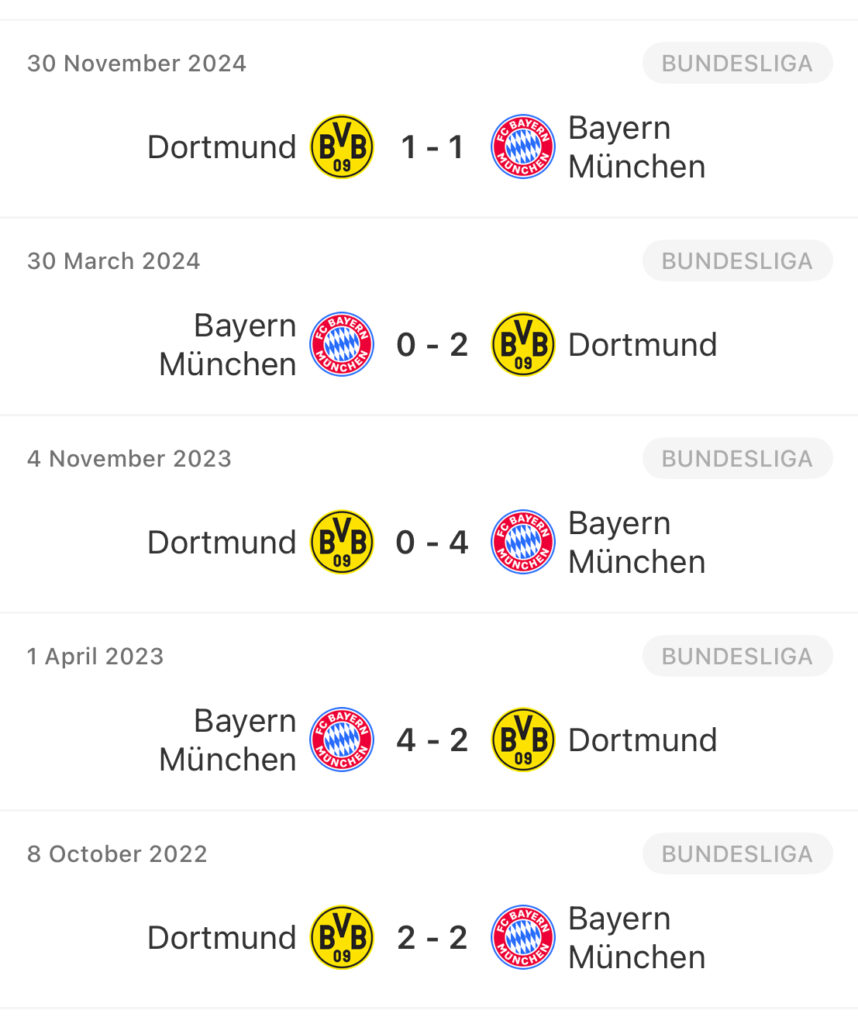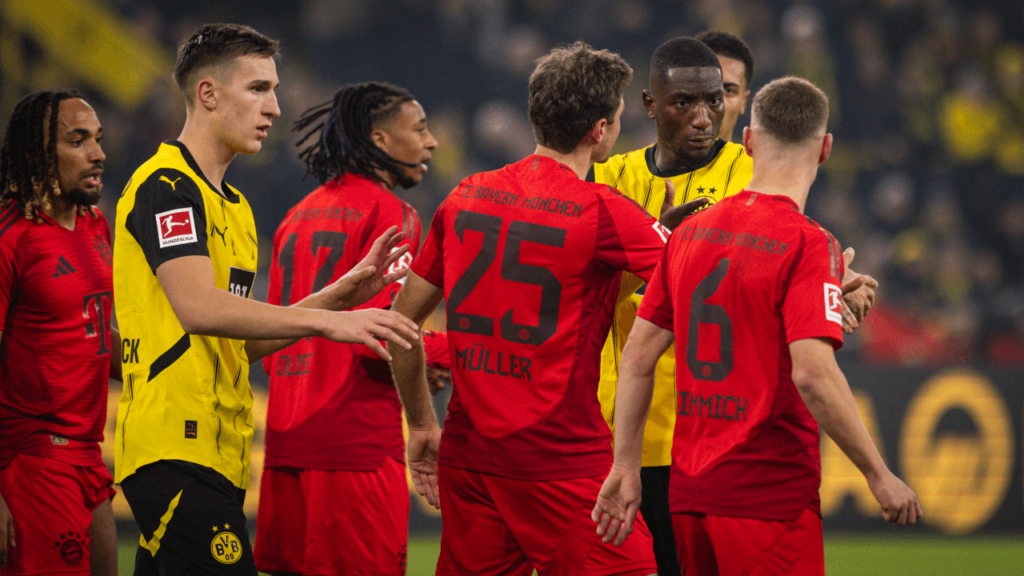By David Skilling
When Borussia Dortmund and Bayern Munich get collectively, followers pack the stadiums, and tens of millions tune in on TV. When the 2 met within the Champions League last at Wembley in 2013, an all-German affair strengthened the Bundesliga on the world stage and stoked the world’s consideration to German soccer. Simply over a decade later, issues look a little bit totally different. Bayern are main the title cost, as is often the case. Nevertheless, Dortmund sit eighth within the league. But nonetheless, this weekend’s assembly will dominate the headlines, draw worldwide viewership, and carry a weight far heavier than league positions.
As a result of this isn’t only a match; it’s a cultural collision.
In contrast to El Clásico in Spain, or Manchester United vs Liverpool, Bayern Munich vs Dortmund doesn’t fairly have the identical hatred hooked up, however it’s actually a heated affair. The friction actually started within the Nineties, as Dortmund rose to problem Bayern’s home reign within the Bundesliga period of German soccer, profitable titles in 1995 and 1996 earlier than lifting the Champions League in 1997.
Bayern, ever the dominant drive, weren’t used to being upstaged. The rivalry intensified within the 2010s when Jürgen Klopp’s model of soccer lit up Germany, and Dortmund, backed by a fan-first philosophy and savvy recruitment, did the unthinkable: they outplayed and outshone Bayern for 2 straight seasons.
However Bayern responded the one approach Bayern know the way, by asserting dominance. They reclaimed the title, signed Dortmund’s star gamers (Lewandowski, Götze, Hummels), and strengthened the picture many already held: That Bayern don’t simply beat their rivals, they take in them.
‘Der Klassiker’ or Simply Intelligent Advertising and marketing?
Some German followers roll their eyes on the time period “Der Klassiker.” It doesn’t have the historic gravity of El Clásico, and it wasn’t born from political or non secular divides. As a substitute, it was coined by the media, desperate to place the Bundesliga as a world product.
However, semantics apart, the strain between these golf equipment is actual, and it captures world consideration. In contrast to some rivalries that burn out when one staff slips, Bayern-Dortmund has endured by way of imbalance. The video games are virtually all the time intense and unpredictable, even when the title isn’t on the road. Like this weekend.
Bayern are league leaders, chasing yet one more title in a run that has seen them topped champions 11 instances within the final 12 seasons. Dortmund, in the meantime, are clinging to Europa League hopes. On paper, this isn’t a title decider. However ask any fan; this match nonetheless issues.

Two Golf equipment, Two Philosophies. What makes this rivalry compelling is just not geography. It’s ideology.
Bayern Munich signify consistency, energy, and elite professionalism. They’re Germany’s company superclub. The membership is polished, globally branded, and infrequently apologetic for its dimension or spending.
Borussia Dortmund, alternatively, are the folks’s membership. Their house, Sign Iduna Park, isn’t just a stadium. It’s a cathedral of noise. The Yellow Wall of the Südtribüne, is the biggest standing terrace in European soccer, a heaving show of group, loyalty, and defiance. Even in seasons of setbacks, Dortmund followers present up each weekend.
There’s satisfaction in that distinction. The place Bayern entice stars and polish them into title machines, Dortmund are sometimes a launchpad for younger expertise, Erling Haaland, Jude Bellingham, Ousmane Dembélé. They develop, they encourage, after which, usually, they lose them.
To know the emotional temperature of this fixture, take a look at how the followers speak about it.
For a lot of Dortmund supporters, Bayern symbolise the very system they resent. They’re the explanation the Bundesliga has lacked true competitors. They’re the wealthy youngsters who win each prize after which purchase the most effective gamers to do it once more. The transfers of Lewandowski and Götze weren’t simply strikes, they had been emotional ruptures.

For Bayern followers, they see their rivals as plucky however inconsistent, nice for the impartial, however by no means really threatening in the long run. And but, they by no means underestimate them as a result of when Dortmund click on, they’ll nonetheless tear anybody aside.
The dynamic is layered. It’s not pure hatred. It’s nearer to resentment, laced with grudging respect.
This isn’t a conflict of equals this time round. Bayern look set to assert the league as soon as extra. Dortmund, in the meantime, are navigating a difficult home marketing campaign, having failed to enhance on final season. However what’s all the time at stake in Der Klassiker is satisfaction. Notion. Narrative.
Der Klassiker is many issues: a advertising instrument, a home energy battle, a cultural tug-of-war. However greater than something, it’s a mirror of German soccer, exhibiting us each its strengths and its flaws.
A league beloved for its fan-first mannequin, its 50+1 possession rule, its affordability and environment, however weighed down by a scarcity of real competitors on the high. It’s a league that protects fan tradition like no different, but a system that enables one membership to dominate relentlessly. It’s a rustic that produces extraordinary expertise however struggles to retain it. It’s a soccer tradition constructed on beliefs, custom, and values, and one nonetheless determining the best way to compete in a contemporary, globalised soccer economic system.
This sport might not be an area derby or a match-up fueled on a long time of hatred. However it’s way over only a fixture. It’s the sport that drives the Bundesliga machine on the worldwide stage and is commonly a showcase for the perfect in German expertise.
(Pictures from IMAGO)
You may observe each sport from the Bundesliga on FotMob – with in-depth stat protection together with xG, shot maps, and participant rankings. Obtain the free app right here.

